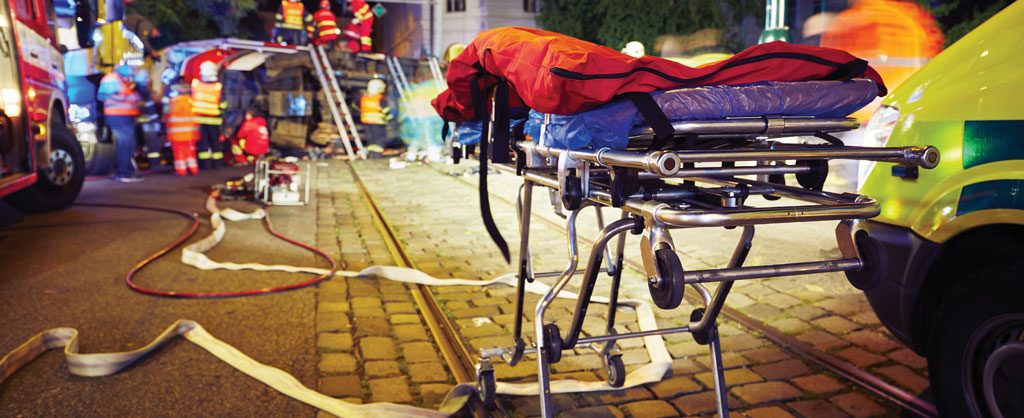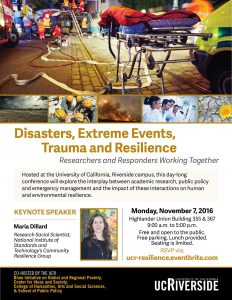Disasters, Extreme Events, Trauma and Resilience
Researchers and Responders Working Together
November 7, 2016 @ 9:00 AM – 5:00 PM
Highlander Union Building 355 & 367
Hosted at the University of California, Riverside campus, this day-long conference will explore the interplay between academic research, public policy and emergency management and the impact of these interactions on human and environmental resilience.
Download Speaker’s Slide Presentations
Co-Sponsored by the UCR
Conference Schedule
| 9:00-10:00 | Registration (Lobby) Coffee and continental breakfast (HUB 355) |
| 10:00 | Welcome and introductions |
| 10:15 | Keynote Lecture (HUB 355) Maria Dillard (NIST’s Community Resilience Group) Planning for Community Resilience: Approaches, Tools and Partners |
| 11:00 | Discussion and Q&A |
| 11:30-12:30 | Lunch (HUB 367) |
| 12:30-2:00 | Panel: Case Studies in Resilience (HUB 355) Brian Mayer (Univ of Arizona) Resilience and Recovery in the Gulf: Bouncing Back (Or Not) from the 2010 Gulf Coast Oil Spill Fernando Rivera (Univ of Central Florida) Resilience to Cope with Natural Disasters in a Farmworker Community Catherine Gudis (UC Riverside) The Homeless Disaster: Art and the Politics of Representation in LA’s Skid Row David Abramson (New York Univ) 4,137 Survivors: The Lessons of 3 Disasters |
| 2:00-2:30 | Break (HUB 367) |
| 2:30-4:00 | Panel: The Context for Resilience (HUB 355) Jim Elliott (Rice Univ) Beyond Disaster: Taking a Broader Look at Natural Hazards and Social Vulnerability (through Nationally Representative Sampling) Faith Kearns (California Institute for Water Resources) Trauma in ‘Slow’ and ‘Fast’ Natural Disasters Invites Varied Perspectives and Responses Michael Antonucci (San Bernardino County Emergency Management) Role of Local Government Agencies in Disaster Response, Relief and Resilience Debra J. Williams (Building Resilient Communities) Engaging the Whole Community |
| 4:00-5:00 | Summation (HUB 355) |
Keynote Speaker Bio
Dr. Maria Dillard is a Research Social Scientist for the National Institute of Standards and Technology’s Community Resilience Group. Previously, she was a Social Scientist for the National Oceanic and Atmospheric Administration’s National Centers for Coastal and Ocean Science. Maria has PhD in Sociology from the University of Pittsburgh with a focus on the measurement of social-ecological resilience for coastal and island communities. Maria is adjunct faculty at the College of Charleston.
Maria has more than ten years of experience in social science research within academic and applied settings. This experience includes interdisciplinary research for federal agencies – the National Institute of Standards and Technology (NIST), the National Oceanic and Atmospheric Administration (NOAA), and the Veterans Health Administration (VHA). Additionally, Maria has professional experience in community engagement through positions focused on communications, public education, and community outreach for environmental, healthcare, and social issues.
Maria’s research is focused on community response to hazards and chronic stressors and the development of methods for measurement and modeling community resilience, well-being, and vulnerability as a means of strengthening the ability of communities to respond to and plan for natural and technological events. Her work includes development and application of a measurement model for community well-being following the Deepwater Horizon oil spill, integrated assessments of community vulnerability to climate change for climate adaptation planning, and quantification of human use and dependence on natural resources. In her current role, Maria will expand NIST’s research on community resilience with a particular emphasis on the social dimensions of disasters and recovery.
Organizers
Milagros Peña & Anil Deolalikar

